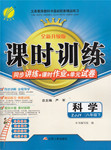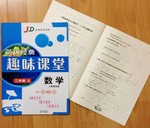题目内容
She used ______ on the right in China, so she was not used _______ on the left in England at first
- A.to drive; to drive
- B.to drive; driving
- C.to driving; to driving
- D.to drive; to driving
考查use to用法,used to过去常常做某事。Be used to sth/doing sth习惯于某事。句意:她过去常常在中国在右边开车,因此开始她不习惯在英国在左边开车。故选B。

 课时训练江苏人民出版社系列答案
课时训练江苏人民出版社系列答案 黄冈经典趣味课堂系列答案
黄冈经典趣味课堂系列答案 启东小题作业本系列答案
启东小题作业本系列答案As you move around your home, take a good look at the things you have. It is likely that your living room will have a television set and a video, and your kitchen a washing machine and a microwave oven. Your bedroom drawers will be filled with almost three times as many clothes as you need. You almost certainly own a car and possibly a home computer, holiday abroad at least once a year and eat out at least once a week.
Now, perhaps, more than ever before, people are wondering what life is all about, and what it is for. Seeking material success is beginning to trouble large numbers of people around the world. They feel that the long hours work culture to make more money to buy more things is eating up their lives, leaving them very little time or energy for family or pastimes. Many are turning to other ways of living and downshifting is one of them.
Six percent of workers in Britain took the decision to downshift last year. One couple who downshifted is Daniel and Liz. They used to work in central London. He was a newspaper reporter and she used to work for an international bank. They would go to work by train every day from their large house in the suburbs (郊区), leaving their two children with a nanny (保姆). Most evenings Daniel wouldn’t get home until eight or nine o’clock, and nearly twice a month he would have to fly to New York for meetings. They both earned a large amount of money but began to feel that life was passing them by.
was passing them by.
Nowadays, they run a farm in the mountains of Wales. “I always wanted to have a farm here,” says Daniel, “and we took almost a year to make the decision to downshift. It’s taken some getting used to, but it has been worthy of. We have to think twice now about spending money on car repairs and we no longer have any holidays. However, I think it’s made us stronger as a family, and the children are a lot happier.”
Liz, however, is not quite sure. “I used to enjoy my job, even though it was hard work and long hours. I’m not really a country girl, but I suppose I’m gradually getting used to looking after the animals. One thing I do like, though, is being able to see more of my children. My advice for other people wanting to do the same is not to think about it too much or you might not do it at all.”
【小题1】What do the first two paragraphs tell us?
| A.People seldom work long hours to make money. |
| B.People hardly buy more things than necessary. |
| C.People are sure everything they own is in the right place. |
| D.People realize there is more to life than just making money. |
| A.lived in central London | B.disliked his job |
| C.missed his children | D.was well paid |
A.was easy to organize | B.has improved family life |
| C.was extremely expensive | D.has been a total success |
| A.Child-caring. | B.Liz’s advice. | C.Downshifting. | D.Liz’s job. |
As you move around your home, take a good look at the things you have. It is likely that your living room will have a television set and a video, and your kitchen a washing machine and a microwave oven. Your bedroom drawers will be filled with almost three times as many clothes as you need. You almost certainly own a car and possibly a home computer, holiday abroad at least once a year and eat out at least once a week.
Now, perhaps, more than ever before, people are wondering what life is all about, and what it is for. Seeking material success is beginning to trouble large numbers of people around the world. They feel that the long hours work culture to make more money is eating up their lives, leaving them very little time or energy for family or pastimes. Many are turning to other ways of living and downshifting is one of them. Six percent of workers in Britain took the decision to downshift last year.
One couple who downshifted is Daniel and Liz. They used to work in central London. He was a newspaper reporter and she used to work for an international bank. They would go to work by train every day from their large house in the suburbs, leaving their two children with a nanny. Most evenings Daniel wouldn’t get home until eight or nine o’clock and nearly twice a month he would have to fly to New York for meetings. They both earned a large amount of money but began to feel that life was passing them by.
Nowadays, they run a farm in the mountains of Wales. “I always wanted to have a farm then,” says Daniel, “and we took almost a year to make the decision to downshift. It’s taken some time getting used to, but it’s been worth it. We have to think twice now about spending money on car repairs and we no longer have any holidays. However, I think it’s made us stronger as a family, and the children are much happier.
Liz, however, is not quite sure. “I used to enjoy my job, even though it was hard work and long hours. I’m not really a country girl, but I suppose I’m gradually getting used to looking after the animals. One thing I do like, however, is being able to see more of my children. My advice for other people wanting to do the same is not to think about it too much, or you might not do it at all.”
【小题1】The passage tells us that .
| A.people seldom work long hours to make money |
| B.people hardly buy more things than necessary |
| C.people are sure everything they own is in the right place |
| D.people realize there is more to life than just making money |
| A.lived in central London | B.was well paid |
| C.missed his children | D.disliked his job |
| A.was easy to organize | B.was extremely expensive |
| C.has improved family life | D.has been a total success |
| A.repairing your car by yourself |
| B.spending money carefully |
| C.moving out to the countryside to live a simpler and better life |
| D.living in a big house in the suburbs and dining out once a week |
As you move around your home, take a good look at the things you have. It is likely that your living room will have a television set and a video, and your kitchen a washing machine and a microwave oven. Your bedroom drawers will be filled with almost three times as many clothes as you need. You almost certainly own a car and possibly a home computer, holiday abroad at least once a year and eat out at least once a week.
Now, perhaps, more than ever before, people are wondering what life is all about, and what it is for. Seeking material success is beginning to trouble large numbers of people around the world. They feel that the long hours work culture to make more money is eating up their lives, leaving them very little time or energy for family or pastimes. Many are turning to other ways of living and downshifting is one of them. Six percent of workers in Britain took the decision to downshift last year.
One couple who downshifted is Daniel and Liz. They used to work in central London. He was a newspaper reporter and she used to work for an international bank. They would go to work by train every day from their large house in the suburbs, leaving their two children with a nanny. Most evenings Daniel wouldn’t get home until eight or nine o’clock and nearly twice a month he would have to fly to New York for meetings. They both earned a large amount of money but began to feel that life was passing them by.
Nowadays, they run a farm in the mountains of Wales. “I always wanted to have a farm then,” says Daniel, “and we took almost a year to make the decision to downshift. It’s taken some time getting used to, but it’s been worth it. We have to think twice now about spending money on car repairs and we no longer have any holidays. However, I think it’s made us stronger as a family, and the children are much happier.
Liz, however, is not quite sure. “I used to enjoy my job, even though it was hard work and long hours. I’m not really a country girl, but I suppose I’m gradually getting used to looking after the animals. One thing I do like, however, is being able to see more of my children. My advice for other people wanting to do the same is not to think about it too much, or you might not do it at all.”
1.The passage tells us that .
|
A.people seldom work long hours to make money |
|
B.people hardly buy more things than necessary |
|
C.people are sure everything they own is in the right place |
|
D.people realize there is more to life than just making money |
2.When Daniel was a reporter, he ______.
|
A.lived in central London |
B.was well paid |
|
C.missed his children |
D.disliked his job |
3.Daniel and Liz both agree that the move to the farm ______.
|
A.was easy to organize |
B.was extremely expensive |
|
C.has improved family life |
D.has been a total success |
4.The underlined word “downshifting” in the 2nd paragraph refers to ______.
|
A.repairing your car by yourself |
|
B.spending money carefully |
|
C.moving out to the countryside to live a simpler and better life |
|
D.living in a big house in the suburbs and dining out once a week |